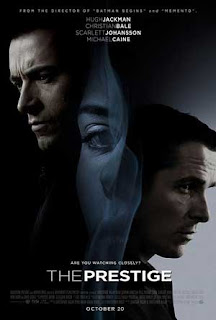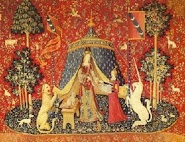
The Prestige is one of my truly favorite films, with a fantastic cast, including Michael Caine, Christopher Bale and Hugh Jackman. Based on Christopher Priest's 1995 book, the film's importance lies in an underlying concept that an audience always believes that somewhere, beneath the tricks, behind the prestige, something more exists--some true magic that fascinates and allures both magician and audience.
 Simply put, the audience cooperates in oblivious moral ignorance while enjoying being hoodwinked. Never realizing or considering the quantity of unseen dead pigeons jettisoned from the magician's collapsed cages after each performance, the audience believes in the trick, and equally believes that the magician holds some secret magic power that makes the impossible possible. For the audience, possibility of the existence of magic somehow makes their individual lives more hopeful and meaningful, and thus more bearable.
Simply put, the audience cooperates in oblivious moral ignorance while enjoying being hoodwinked. Never realizing or considering the quantity of unseen dead pigeons jettisoned from the magician's collapsed cages after each performance, the audience believes in the trick, and equally believes that the magician holds some secret magic power that makes the impossible possible. For the audience, possibility of the existence of magic somehow makes their individual lives more hopeful and meaningful, and thus more bearable.

It is an old theme, worth repeating, that pursuit of illusory success always comes at some cost. We rarely ask ourselves how complicit we may by our passive enjoyment of those who bemuse and bedazzle us, while they may be tempted to exceed moral limits in their pursuit of ever greater illusions. The search for magic, for the secrets that defy rationality, lead us to delight in strange phenomena, to trust in those who challenge and distort our perceptions of reality and lead us to believe in strange powers that "lie beneath" revealed truths. A cameo by David Bowie as the mad genius Tesla underlines the complex relationship between technological wonders and moral consequences.
In the Victorian era, Freud posed ideas of the unconscious mind--a world that lay beneath perception--while new inventions, such as radiation and electricity, defied known reality. Many writers and thinkers of that era questioned and examined the uneasy borders between magic and science, good and evil, progress of mankind and the callous use of others to serve greed and pride.
Two rival magicians, Borden, played by Christopher Bale, and Angiers, portrayed by Hugh Jackman, engage in a vicious rivalry with terrible cost. The envious Angiers pursues and exploits the chimera of the perfect trick, in order to overshadow the succes of his bitter rival. The complete moral bankruptcy of Jackman’s character, and the complicity of the audience through their suspended rationality, fueled by a willingness to believe in magic, reveals a horrifying result.
 Simply put, the audience cooperates in oblivious moral ignorance while enjoying being hoodwinked. Never realizing or considering the quantity of unseen dead pigeons jettisoned from the magician's collapsed cages after each performance, the audience believes in the trick, and equally believes that the magician holds some secret magic power that makes the impossible possible. For the audience, possibility of the existence of magic somehow makes their individual lives more hopeful and meaningful, and thus more bearable.
Simply put, the audience cooperates in oblivious moral ignorance while enjoying being hoodwinked. Never realizing or considering the quantity of unseen dead pigeons jettisoned from the magician's collapsed cages after each performance, the audience believes in the trick, and equally believes that the magician holds some secret magic power that makes the impossible possible. For the audience, possibility of the existence of magic somehow makes their individual lives more hopeful and meaningful, and thus more bearable. Rival magicians know better, and try to discern the trick, while knowing that any magician's popularity rests in the perfection of the illusion, the prestige that makes an audience gasp with wonder. Night after night, Jackman’s character performs a trick that is unthinkably immoral and callous, and thus completely puzzling to audiences and fellow-magicians. His quest to defy natural laws, to exceed knowable limits, to harness scientific discovery in search of the perfect trick, leads him to commit deplorable crimes for the sake of entertainment and personal ambition.

It is an old theme, worth repeating, that pursuit of illusory success always comes at some cost. We rarely ask ourselves how complicit we may by our passive enjoyment of those who bemuse and bedazzle us, while they may be tempted to exceed moral limits in their pursuit of ever greater illusions. The search for magic, for the secrets that defy rationality, lead us to delight in strange phenomena, to trust in those who challenge and distort our perceptions of reality and lead us to believe in strange powers that "lie beneath" revealed truths. A cameo by David Bowie as the mad genius Tesla underlines the complex relationship between technological wonders and moral consequences.
In the Victorian era, Freud posed ideas of the unconscious mind--a world that lay beneath perception--while new inventions, such as radiation and electricity, defied known reality. Many writers and thinkers of that era questioned and examined the uneasy borders between magic and science, good and evil, progress of mankind and the callous use of others to serve greed and pride.
These great historical themes concerning the moral cost of man's imaginative ambition deserve consideration, especially, in light of today's globalized seduction of willing consumers/audiences through use of a dazzling array of technological advances, often with little regard for moral consequences. The unchanging human heart continues to be complicit in being hoodwinked by its fascination and underlying belief in magic—arrayed as science, progress, security, or simple entertainment— that may hide a moral abyss of unthinkable secrets.




